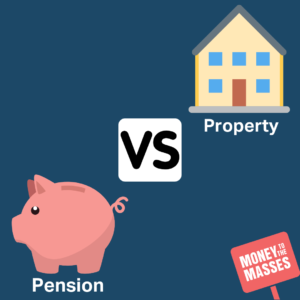
There’s no denying the appeal of an investment asset that is real and tangible, and this goes some way to explain the enduring popularity of property as an investment in this country. For some people, concerns about the unpredictability of financial market movements mean they would rather invest in property to fund their retirement than save into a personal pension. This might mean building a portfolio of buy-to-let properties or just owning their own home. But is this a good idea? How does investing in property really stack up against investing in a personal pension, all things considered?
What are the advantages and disadvantages of investing in a pension to fund your retirement?
The table below sums up the advantages and disadvantages of investing into a pension.
| The pros of investing in a pension | The cons of investing in a pension |
| You get free money from the government in the form of tax relief on your contributions | Your money is locked away until at least age 55 (rising to 57 in 2028) |
| If you are in employment, your employer has to pay into your workplace pension | There’s no guarantee when it comes to investment performance – your investments could fall in value meaning you run out of money in retirement |
| Your money is invested in a diversified portfolio of assets (including property if you like), spreading your risk | You have to pay fees and charges on your investments |
| If you start saving early, the power of compound interest means your pot could grow significantly | Some schemes have limited investment choice and poorly performing funds |
| You could in theory set and forget your pension (although it’s better to review regularly) whereas property is much more hands-on | You pay income tax on anything you withdraw above the 25% tax-free lump sum |
| Your pension is protected if the FCA-regulated provider goes bust | |
| Contributions are flexible and you can start small | |
| You can time withdrawals to reduce your tax bill, as part of tax planning |
What are the advantages and disadvantages of investing in property to fund retirement?
| The pros of investing in property | The cons of investing in property |
| You own a real asset | You pay capital gains tax on property when you sell, income tax on your rental income, and inheritance tax when you die |
| Property values are on a long-term rising trend so you could benefit from capital growth | Property is an illiquid asset so your money is tied up for a long time |
| You also get the double whammy of rental yields which can give you a rental income of 8% or more | You may not be able to sell when you want to, at least not at a price you’re happy with |
| You could "retire early" if you build a large enough portfolio; you can't access your pension fund until your mid-50s, but no such restrictions exist with property | You could end up in negative equity |
| You pay more in tax now as a buy-to-let landlord because, for example, you can no longer claim tax relief on mortgage interest payments | |
| You may have to pay stamp duty when you buy a property | |
| Costs can be high, such as repairs, maintenance, legal fees, surveyors’ fees, agents’ fees, insurance, and you could lose money from non-paying tenants or void periods | |
| You can spend a lot of time and effort managing a property yourself, and you have legal responsibilities as a landlord | |
| Mortgage payments tend to be fixed and inflexible |
Property vs Pension - which is best?
Below, we discuss some of the key factors to consider before you decide whether pensions or property are right for you.
Investment growth
First, let’s think about investment performance. House prices have beaten inflation by around 3% a year since 1955, while the UK stock market has grown at double that rate over the same period, although these figures exclude rental and dividend yields. With buy-to-let property, you could benefit from capital appreciation as well as rental yields, while stock market investing can give you share price growth plus dividends.
In a recent piece of research, Hargreaves Lansdown highlighted a FTSE All-Share prospective dividend yield of 4.3% compared to the average England and Wales rental yield of 5.9%. For a more personalised comparison of property versus your pension, you could try playing around with a pension calculator such as this one. It lets you see a pension projection based on how much you currently have in your pot, and how much you are paying in, and assumes investment growth of 5% a year before the impact of inflation and charges. You may get more or less growth than this depending on what is in your portfolio and how it performs over time. You can look at past performance for an idea, although of course, this is no guarantee of what will happen in future, as this will depend on how financial markets move.
The other important thing about pensions is that, if you are contributing to a workplace pension scheme, your employer has to pay in too, at least 3% of your qualifying earnings under current auto-enrolment rules. This is a fantastic bonus that can make a huge difference in the growth of your pension pot over time. Pensions are also tax-efficient. You get tax relief on what you pay in, at a rate of 20% for basic rate taxpayers, 40% for higher rate taxpayers, and 45% for additional rate taxpayers, up to a maximum of 100% of your earnings or a £60,000 annual allowance, whichever is lower. What that means in practice is that a £100 contribution only costs you £80 if you’re a basic rate taxpayer. You also get the perk of being able to take out up to 25% of your pot as a tax-free cash lump sum once you reach the age of 55.
Rental income vs dividends
If you’re investing in buy-to-let property, your aim will usually be to get the highest rental yield you can. This is the return your property achieves through the rent you can charge your tenants. It is worked out by dividing the total yearly rental income by the amount you have invested in the property.
What is a good rental yield on property? Some experts say anything above 7% or 8%. It must be high enough to cover the mortgage payment, contingencies such as repairs and maintenance, and any other associated costs such as tax, insurance and agents’ fees, and still make you a profit. There are free rental yield calculators available online that can help you work out what you should be charging, but ultimately your rental yield will be determined by what the market will bear.
Another way to make a regular income without the hassle of dealing with a tenanted property is to buy dividend-producing investments through a pension. You could buy a low-cost passive product such as an exchange-traded fund (ETF) that tracks the performance of the UK’s highest dividend-paying stocks, such as the iShares UK Dividend UCITS ETF, for example, which selects from across the FTSE 350 and pays out an income quarterly. You could also choose an active fund or investment trust which pays a monthly or quarterly income, such as Invesco Monthly Income Plus, Schroder Monthly Income or Merchants Trust, which each yield around 5% on average. Another option could be to hold individual shares and build your own portfolio of dividend-paying companies.
Inheritance Tax
When you die, your estate will be subject to inheritance tax (IHT), and this includes properties you own and investments like a share portfolio. As property prices have risen over the years (especially in London and the South East) more people have been caught in the IHT net. The current IHT threshold is £325,000 for a single person, and any assets worth more than this are subject to tax at a rate of 40%. Check out our article '10 best ways to avoid inheritance tax' for more information on how to minimise inheritance tax.
Pensions, however, are usually exempt from IHT, although there are some restrictions. If you had taken money out of your pot and not spent it by the time you died, that would form part of your estate and be subject to IHT. But if you died before the age of 75, a beneficiary who inherited your pension pot within two years would not pay tax on it.
If, say, you were using a combination of property, a share portfolio and a pension to fund your retirement, you’d be better to use up the IHT-able assets first and save your pension money until last. Read more in our article 'What happens to my pension when I die?'.
Risk
The main risk of investing in property is that it won’t rise in value over time and that your rental income is outweighed by the costs you incur.A raft of regulatory and tax changes have made buy-to-let a much less lucrative option for small-time landlords, many of whom are either scaling up or selling out. So you’ll need to crunch the numbers and work out whether buy-to-let is worth it for you after all these changes.
You also need to be prepared for void periods when the property is empty between tenancies and rogue tenants who cause damage or don’t pay their rent. If you don’t want to be a hands-on landlord day-to-day, you’ll need to find and pay a trusted agent to deal with your tenants and manage repairs or deal with any issues that arise.
When you’re thinking about how to make money investing in property, you’ll also need to be planning your exit strategy. Will you be able to sell your property investment and make a profit on it in the future? Where is it located, is the area desirable, have you added value to the property, will it attract reliable tenants? There are many questions you should ask yourself when you’re considering how to invest in property successfully.
Equally, there are risks to investing in a pension. The primary one is that you will get back less than you put in, although this is pretty unlikely given the length of time you will be invested in financial markets. You could find that the fund’s returns do not keep pace with inflation, especially given how high inflation has been in recent years and this could mean you end up with a negative real return. If your pension pot does not grow as you had hoped, you could run out of money in retirement. One option to hedge your bets here is to use some of your pension savings to buy an annuity, so you have the certainty of a guaranteed payout for the rest of your life. Check out our article 'What is a sustainable income that you can drawdown from your pension?'.
Cost
When you invest into a pension, you can pay management fees on the funds you hold, transaction fees, platform fees, advice fees to your financial adviser or wealth manager if you have one. These regular fees, some of them small, can mount up. Check out our article 'The best and cheapest SIPPs and low-cost DIY pensions' for a comprehensive comparison of the best value Self Invested Personal Pensions (SIPPs) in the UK. Pensions have the advantage of giving you tax relief on contributions, but anything you withdraw above the 25% tax-free threshold may be liable to income tax.
With property, you pay larger one-off costs, primarily in the form of taxes, although conveyancing or other legal fees, maintenance costs, agent or other management costs can also make a big dent in your returns. You’ll pay income tax on your rental income, and capital gains tax when you come to sell a property and realise a profit. Additionally, you'll have to pay stamp duty land tax, check out our article 'Everything you need to know about Stamp Duty' for the latest rates. Finally, after you die, the property you own forms part of your estate for income tax purposes, so it will be subject to inheritance tax (see above).
Other alternatives
Another option could be to save into ISAs, which are tax wrappers that don’t lock your money away until a certain age (except the Lifetime ISA). However, the ISA allowance is lower than the pension annual allowance at £20,000 for the 2024/25 tax year, so you can’t put away as much. You could also consider saving into your employer’s Save As You Earn scheme if it has one, or just build your own portfolio of funds or shares.
Should you view your home as a pension?
Your home may be an appreciating asset (for now, although there is no guarantee prices will keep going up forever, especially with house prices starting to fall), but you have limited options for realising the value of that asset because you are living in it. You could sell or downsize, of course, and live on the proceeds.
But you may have to use some of the money to fund your care in later life because local authority care home fees are means-tested.
You could also consider equity release, where a provider gives you a lump sum now and recoups it by selling your house after you die. But interest rates on this type of borrowing can be very high and, unless you choose a reputable provider, your estate could end up owing more than the value of your house after you die.
Equity release might be suitable for some people but it requires great care. Using your home as a pension is possible for some people, but you need professional, impartial advice to make sure it’s right for you.
Should you invest in pensions or property?
Both pensions and property have their pros and cons when it comes to retirement planning. Property can be the right choice for some, but it isn't right for everyone. The key thing to remember is that property isn't passive income, particularly if you have tenanted properties. You will need to put time and money into managing your properties even if you have a real estate agent to deal with most issues.
On the other hand, pensions come with employer contributions, government tax relief, and the opportunity to benefit from compound interest over decades of contributing. However, you will typically have less control over your funds and will need to wait until you're at least in your mid-50s to access them, and possibly longer as the normal minimum pension age is on the rise.
As such, while pensions "win" in terms of ease and convenience, if you're able to invest in property (whether that's your own home or an additional property), you could diversify your portfolio and have more control over when you retire.




